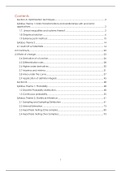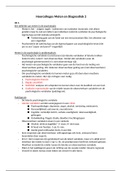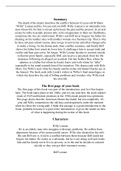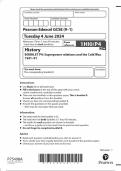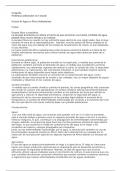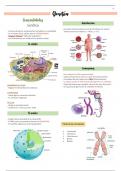➔ The Congo and Tanzania are neighbouring countries, with Lake Tanganyika between
their borders
➔ Though the countries are not far apart, they have had very different paths to
independence
➔ The Congo and Tanzania had different European colonizers, which meant that in each
country the European colonialists would have a different way of governing
➔ While the challenges facing each country would've been the same, their challenges were
unique as they were dealing with different departing colonial powers
The Congo:
● During the colonial occupation of the Congo, the relationship between the rulers and the
people they ruled was stormy
● The geographical location of the Congo meant that it was one of the most mineral-rich
colonies in Africa.
● Between 1884 and 1908, King Leopold II of Belgium forcefully exploited ruber,ivory
cooper and other minerals to generate enormous wealth for himself
○ King Leopold II generated this wealth by exploiting and brutually mistreating the
local population and devastating the Congo's natural resources
● King Leopold II ruled the Congo Free State in his personal capacity:
○ In 1908 - Belgium took over Leopold's control of Belgium as a result of his
ruthlessness
○ Nearly half of the Belgian Congo population died under King Leopold's rule
● After WW1, the Belgians changed the administration of Congo to a government system
and gave priority to the mining of copper, cobalt, diamonds and gold and the
transportation of these minerals
● Even though the workers and local people were not harmed as much as before, the vast
colony was run on the forced labour of "able-bodied workers"
○ Therefore, until independence, the Congo made Belgium rich and it kept
exploiting the rich mineral resources as well as the local people
,How did the Congo become a tool of the Cold War
● The Congo was tool of the Cold War because the conditions in the Congo were
exploited by the US and the USSR to further the rivalry between them
● 4 January, 1959 - Violent riots occur in Leopoldville (the capital of the Congo)
○ Government buildings and churches are destroyed
○ The people of the Congo shower their anger and frustration at the colonisers
○ The Belgians panic at the violence and agree to end colonial rule
○ The Belgians then try to go back on the deal
● October, 1959 - Riots erupt in the north of the Congo
○ Patrice Lumumba is arrested for inciting violence and is sentenced to six months
of imprisonment
● May, 1960 - Independence elections are finally announced in the Congo
○ Nearly 120 political parties register, representing the Congo's large diversity of
ethnic groups
○ The divisions along ethnic lines make the Congo vulnerable to struggles for
power
● 30 June, 1960 - Independence is granted to the Congo
○ Patrice Lumumba became the first legally elected PM of the Republic of the
Congo
○ Joseph Kasa-Vuba is elected president
● On the day of independence (30 June, 1960), Lumumba gave a speech in response to
the Belgian King Baudouin's praising of the developments of colonialism
○ Lumumba reminded the audience that Belgiu did not grant the independence of
the Congo in a king and willing manner and that the Congo had suffered to gain
its freedom
● 5 July, 1960 - The Force Publique (the Congo's governmental army) revolts against its
white Belgian officers
○ Lumumba replaces the entire body of white officers with Congolese officers
○ Lumumba promotes Joseph Mobutu (Lumumba's secretary) to the Chief of Army
● 11 July, 1960 - The mineral rich province of Katanga, led by Moise Tshombe, withdraws
from the Congo
○ Belgium, interested in preserving access to mines in Katanga, sends troops and
military equipment to help Tshombe's men
○ Lumumba calls on the US to assist in removing the Belgian presence in Katanga,
because the Belgians are violating the Congo's independence
● Belgium was not ready to let go of the natural resources of the Congo, which had been a
source of much wealth and had massively developed Belgium's economy
○ Therefore, the Belgian government, instead of helping the newly independent
Congolese, wanted to maintain economic control of the Congo
○ Belgium exercised control by sending mercenaries to the country to aid Tshombe
and by working through mining groups in Katanga, which were economically
important and which they still controlled
, ● The Belgian government used the Cold War as an excuse for this behaviour, saying
repeatedly that they were only interested in preventing the spread of Soviet or
communist influence in the Congo
○ Even if this was partly true, the motivation behind this was that the Congo was
too rich in resources, mining opportunities and wealth to be allowed to fall outside
Western corporate control
○ The Belgian government did not want the communists to obtain what they still felt
was rightly theirs
● 15 August, 1960 - The UN removes the Belgians from the Congo, but do not help
Lumumba put down the Katanga rebellion
○ Lumumba then invites the USSR into the Congo to help squash the Katanga
rebellion
○ Lumumba's actions of requesting and receiving USSR aid transform the Congo
into a new zone of Cold War rivalry
● 18 August, 1960 - US President Eisenhower is furious that Lumumba had involved the
USSR, therefore allowing them a base of power in the heart of Africa
○ Eisenhower gives the CIA permission to "eliminate" Lumumba
○ Tshombe (in Katanga) and Belgian authorities accept the CIA's plan to
assassinate Lumumba
● The Belgian government would do anything to ensure that a weak political lead who was
loyal to them came into power - Lumumba was anything but weak and compromising
○ Lumumba's Independence Day speech, along with his willingness to involve the
USSR to try remove Belgian influence in the Congo, meant that he was exactly
the type of leader that Belgium could not have ruling the Congo
● 5 September, 1960 - State President Joseph Kasa-Vubu announces the removal of
Patrice Lumumba as PM and in his place appointed Joseph Ileo
○ In response, Lumumba announces that he has dismissed Kasa-Vubu as
president and chaos and confusion spread throughout the Congo
● 14 September, 1960 - Joseph Mobutu initiates a coup in the Congo
○ Mobutu is aided by the CIA
○ Lumumba's policies and his vision of a united Congo made him enemies of the
US and Belgium, who worked together to have him assassinated
○ The CIA initially ordered his assination but could not complete the job. Instead,
the US and Belgium gave money and aid to Mobutu to arrest and eliminate him
○ Mobutu creates a government with Kasa-Vubu in charge
● This political fragmentation of government escalated so that by the end of 1960 the
Congo had split into 4 "regimes":
○ Joseph Mobutu in Leopoldville (supported by Western governments)
○ Antoine Gizenga in Stanleyville (supported by the Soviet Bloc, Fidel Castro's
Cuba and newly independent socialist African nations like Ghana & Guinea)
○ Albert Kalonji in South Kasai (supported by the Luba of Kasai)


